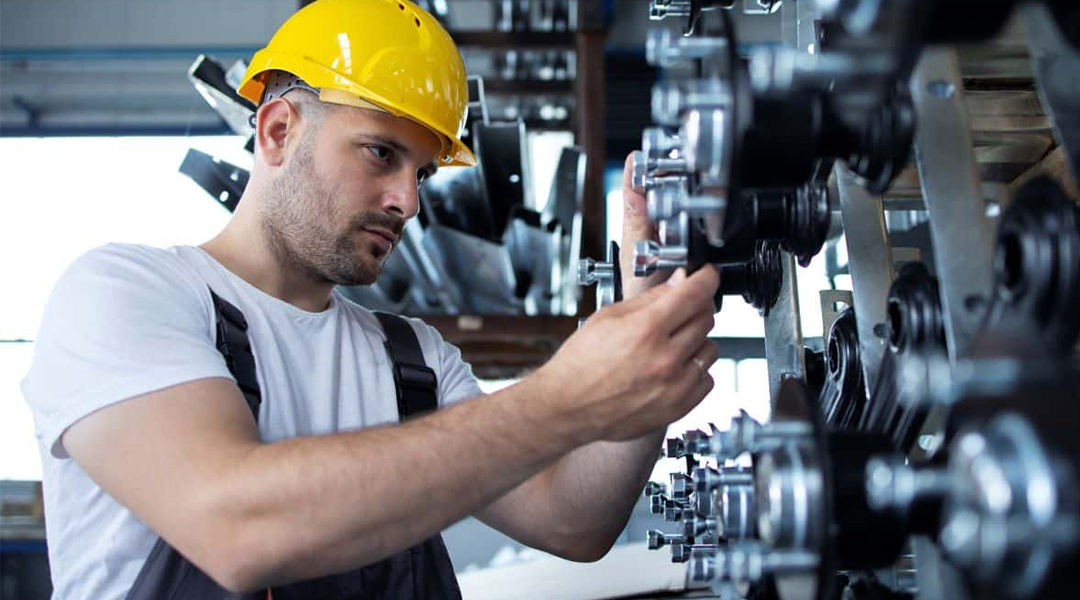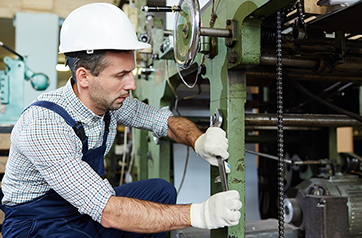In the metal manufacturing and food processing industries, machinery performance is a critical factor in achieving high levels of productivity and operational efficiency. This performance is heavily influenced by the quality and effectiveness of the maintenance strategies employed by businesses. By implementing a proper machinery maintenance strategy, companies can effectively reduce downtime, minimise production bottlenecks, and ensure optimal equipment performance, directly contributing to increased productivity and cost savings. In this blog post, we will discuss the importance of proper machinery maintenance in metal manufacturing and food processing environments and how to develop a maintenance strategy that enhances productivity while maintaining budget and safety requirements.
Developing a comprehensive machinery maintenance plan can bring numerous benefits to your metal manufacturing or food processing business. Not only does proper maintenance help prolong the lifespan of your machinery, but it can also improve the quality and predictability of your output, ensuring that your business meets client demands and maintains a competitive edge. Additionally, well-maintained machinery is less likely to contribute to workplace accidents or environmental incidents, ensuring your facility operates in a safe and compliant manner.
In the following sections, we will explore various elements of a successful machinery maintenance strategy, including the importance of preventative maintenance, steps for creating a comprehensive maintenance schedule, identifying and addressing common maintenance challenges, and the role of maintenance engineering service providers, like Meng Solutions. We will also provide examples and real-world applications of these principles to demonstrate the benefits of a proper maintenance strategy in enhancing productivity, operational efficiency, and business sustainability.
Join us as we delve into the essential components of an effective machinery maintenance plan, uncovering strategies and insights to help your metal manufacturing or food processing business achieve new heights in productivity and operational excellence.
1. The Importance of Preventative Maintenance for Enhanced Productivity
Implementing a preventative maintenance strategy is essential for maximising productivity in metal manufacturing and food processing environments. By proactively inspecting, servicing, and maintaining machinery on a regular basis, businesses can identify and address potential issues before they escalate into costly breakdowns or production disruptions. Key steps for developing an effective preventative maintenance plan include the following:
- Establishing a detailed inventory of all machinery and assets, including information on their age, performance history, and manufacturers’ maintenance recommendations.
- Developing a risk-based prioritisation system to determine which machinery requires more frequent inspection and maintenance based on factors such as equipment age, usage levels, and criticality to the overall production process.
- Assigning responsibilities and establishing clear lines of communication between maintenance teams, equipment operators, and management to ensure that preventative maintenance tasks are carried out effectively and in a timely manner.
2. Creating a Comprehensive Machinery Maintenance Schedule
An essential component of a successful machinery maintenance strategy is a well-structured maintenance schedule. A comprehensive maintenance schedule not only helps in allocating resources and streamlining workflows but also plays a pivotal role in ensuring continuous productivity and minimal downtime. Consider the following steps when creating your machinery maintenance schedule:
- Research the manufacturer’s maintenance guidelines and recommendations to ensure your maintenance schedule aligns with industry best practices and equipment-specific requirements.
- Take into account your production cycle and key operational milestones, scheduling maintenance activities during times of lower production or during planned downtime to minimise disruption.
- Monitor the effectiveness of your maintenance schedule regularly and fine-tune it based on real-world experiences, shifting production demands, and emerging technologies.
3. Identifying and Addressing Common Maintenance Challenges
Proper machinery maintenance requires businesses to be aware of and address common challenges that may impact their productivity and equipment performance. By proactively mitigating these challenges, businesses can ensure consistent output quality, reduced downtime, and a more streamlined maintenance operation. Common maintenance challenges and their solutions include the following:
- Insufficient maintenance resources or manpower: Invest in training and development for your maintenance teams to ensure they have the necessary skills and knowledge to perform maintenance tasks efficiently. Where necessary, consider outsourcing maintenance tasks to a reputable maintenance engineering service provider, like Meng Solutions, to assist with specialised or time-consuming tasks.
- Ageing or obsolete equipment: Evaluate the economic viability of upgrading or replacing older machinery with newer, more efficient alternatives, taking into account factors such as increased productivity, improved safety features, and reduced energy or resource consumption.
- Inadequate spare parts management: Implement an inventory control system to ensure spare parts are available and in sufficient quantities to meet maintenance requirements, reducing downtime and costs associated with stockouts or excess holdings.
4. Engaging Maintenance Engineering Service Providers for Expert Support
Partnering with a maintenance engineering service provider, like Meng Solutions, can provide valuable support and expertise in your quest to optimise machinery maintenance and maximise productivity. These service providers offer specialised knowledge, guidance, and resources for addressing maintenance issues, introducing new technologies, and continuously improving your maintenance procedures. Benefits of collaborating with a maintenance engineering service provider include the following:
- Access to dedicated professionals who can provide specialised and customised maintenance services to ensure your machinery is performing optimally and safely.
- Expert consultation and assistance in developing, implementing, and fine-tuning your machinery maintenance plan, ensuring alignment with industry standards and best practices.
- Ongoing maintenance support and training for your maintenance teams, promoting a culture of continuous improvement and proactive maintenance within your organisation.
Conclusion
Proper machinery maintenance is crucial for achieving productivity gains in metal manufacturing and food processing industries. By developing a comprehensive preventative maintenance strategy, creating a well-structured maintenance schedule, addressing common maintenance challenges, and engaging with expert maintenance engineering service providers, businesses can ensure the consistent and efficient operation of their machinery, boosting productivity and reducing operational costs.
Meng Solutions is dedicated to helping businesses in metal manufacturing and food processing industries optimise their machinery maintenance strategies, working hand-in-hand to implement solutions that enhance productivity, safety, and overall operational efficiency. Contact us today to discover how our team of skilled professionals can support your business in achieving new levels of productivity and success through effective machinery maintenance.




